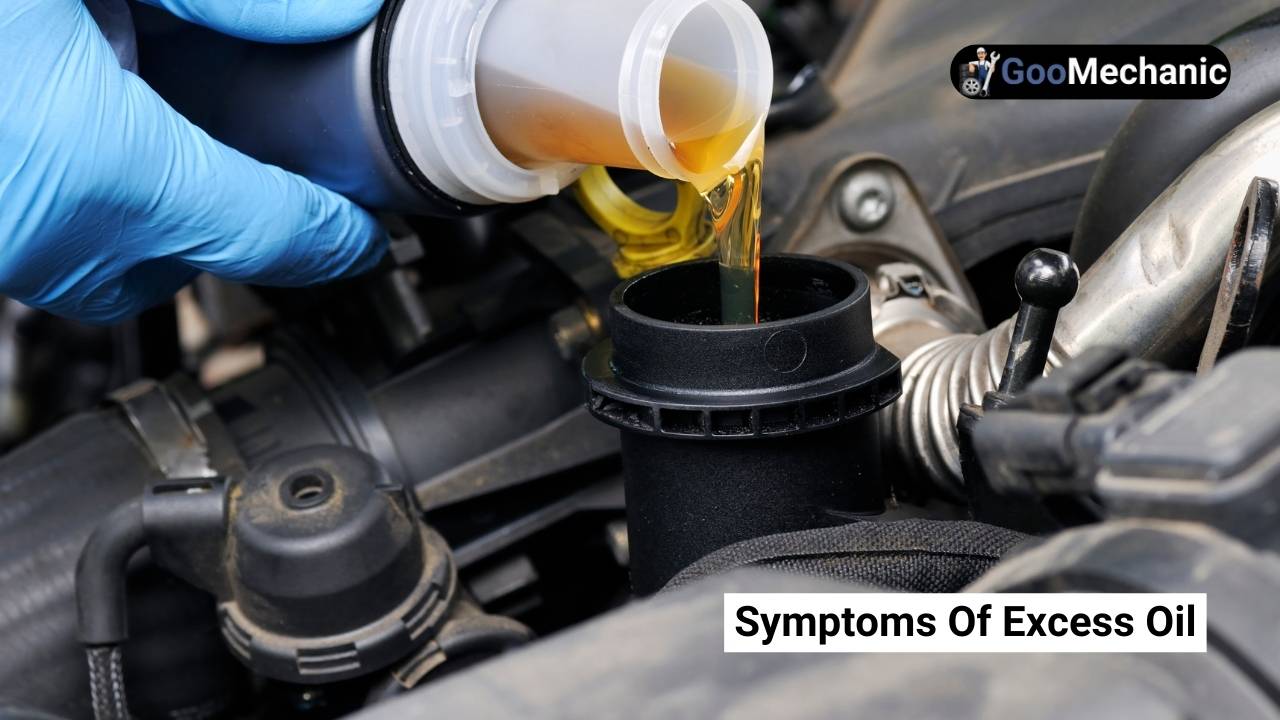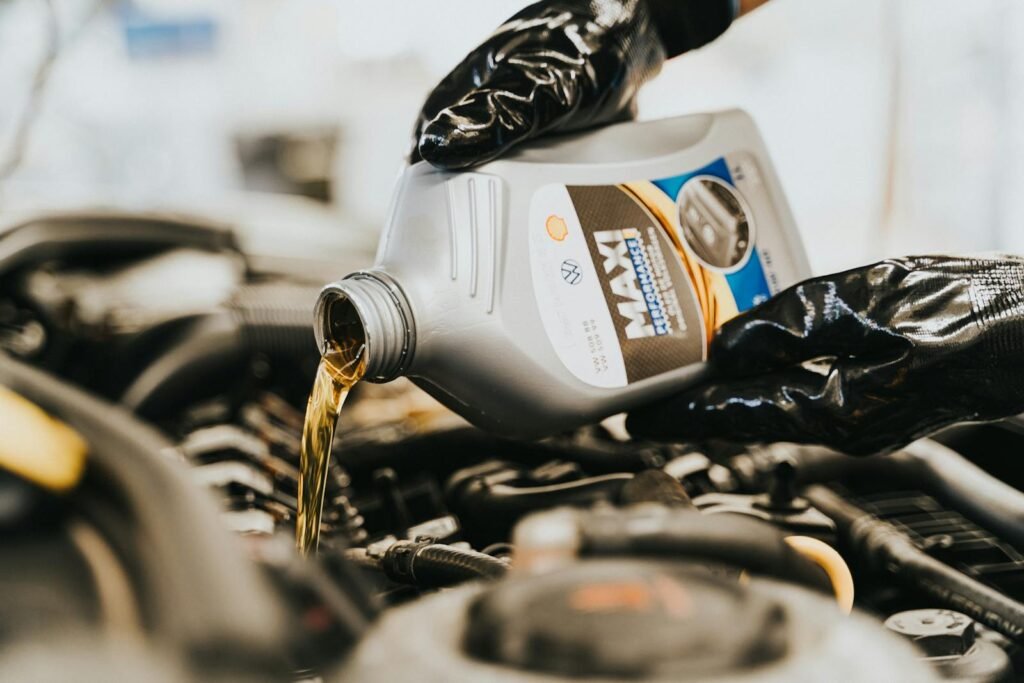Driving a car with too much oil can damage the engine. Excess oil can cause leaks and reduced performance.
Maintaining the correct oil level in your car is crucial for optimal performance and engine health. Overfilling the engine with oil can lead to serious issues, including increased pressure in the crankcase, oil leaks, and even potential damage to engine components.
Excess oil can foam and lose its lubricating properties, leading to increased friction and heat. This can cause parts to wear out faster or even fail. Regularly check your oil levels and ensure they stay within the recommended range. If you suspect overfilling, it’s best to drain the excess oil and consult a mechanic to avoid long-term damage.
Risks Of Overfilling Engine Oil

Overfilling engine oil can cause serious problems for your car. It is important to maintain the correct oil level to avoid these issues. Let’s explore the risks associated with overfilling engine oil.
Potential Damage
Too much oil in the engine can cause various types of damage. Engine components may suffer due to excess oil pressure. This can lead to leaks in the engine seals. Overfilled oil can also cause the crankshaft to dip into the oil, creating froth. This frothy oil cannot properly lubricate the engine parts.
Additionally, the oil may find its way into the combustion chamber. This can result in spark plug fouling and poor combustion. Ultimately, this may lead to engine misfires and decreased efficiency.
Impact On Performance
Too much oil can significantly impact your car’s performance. The engine may feel sluggish and unresponsive. This is due to the extra work the engine must do to move the excess oil. Furthermore, frothy oil fails to provide adequate lubrication, leading to increased friction and wear.
Here are some performance issues you might notice:
- Poor acceleration
- Reduced fuel efficiency
- Increased engine noise
Maintaining the correct oil level is crucial for optimal engine performance. Always check your oil level regularly to avoid overfilling.
Symptoms Of Excess Oil

Driving with too much oil in your car can cause problems. It is important to recognize the symptoms early. This will prevent serious engine damage.
Engine Warning Signs
Excess oil can trigger warning lights on your dashboard. The most common is the oil pressure light. This light indicates too much oil in the system. You might also see the check engine light. Both lights need immediate attention.
Unusual Noises
Excess oil can cause unusual noises in the engine. These noises include knocking or ticking sounds. They occur because the oil creates foam. Foam reduces the oil’s ability to lubricate. This leads to metal parts rubbing together.
| Symptom | Description |
|---|---|
| High Oil Pressure | Too much oil can cause high pressure in the engine. |
| Smoke from Exhaust | Excess oil may burn, causing smoke to emit from the exhaust. |
| Oil Leaks | Too much oil can cause seals to leak, leading to oil puddles. |
- High oil pressure: Indicates excess oil in the system.
- Smoke from exhaust: Burning oil produces smoke.
- Oil leaks: Seals may leak due to high oil levels.
Consequences For Engine Components
Driving a car with too much oil can cause various problems. The extra oil can damage essential engine components. This can lead to expensive repairs. Let’s explore the specific effects on different parts of the engine.
Effects On Gaskets And Seals
Gaskets and seals are crucial for preventing oil leaks. Too much oil can create excessive pressure. This pressure can cause gaskets and seals to fail. When gaskets fail, oil leaks out. This can lead to low oil levels and more damage.
| Component | Potential Damage |
|---|---|
| Gaskets | Can break and cause leaks |
| Seals | Can crack under pressure |
Impact On Spark Plugs
Spark plugs ignite the fuel in the engine. Too much oil can reach the spark plugs. This can cause them to foul. Fouled spark plugs can’t create a strong spark. This leads to poor engine performance.
Over time, fouled spark plugs can cause more severe engine issues. It’s essential to maintain the proper oil level. This helps keep the engine running smoothly.
Handling Excess Oil
Driving a car with too much oil can be dangerous. It can damage the engine. Handling excess oil properly is important. Follow these steps to remove extra oil safely.
Steps To Remove Extra Oil
- Park your car on a level surface.
- Turn off the engine and let it cool.
- Locate the oil drain plug under the car.
- Place a drain pan under the plug.
- Use a wrench to loosen the oil drain plug.
- Let the excess oil drain into the pan.
- Tighten the oil drain plug back in place.
- Check the oil level with the dipstick.
- Add or remove oil as needed to reach the correct level.
Tools Required
- Wrench
- Oil drain pan
- Dipstick
- Gloves
- Rags
Preventing Overfilling

Overfilling your car with oil can cause serious damage. To keep your engine safe, always ensure you add the right amount. This section covers how to measure oil properly and what levels are recommended.
Proper Oil Measurement
Accurate oil measurement is crucial for your car’s health. Follow these steps for a precise reading:
- Park your car on a flat surface.
- Turn off the engine and let it cool.
- Locate the dipstick, usually near the engine.
- Pull out the dipstick and wipe it clean.
- Insert the dipstick back and pull it out again.
- Check the oil level on the dipstick.
Always use a clean cloth to wipe the dipstick. This ensures an accurate reading.
Recommended Oil Levels
Maintaining the recommended oil levels is vital for engine performance. Refer to your car’s manual for specific guidelines. Generally, the oil level should be between the “Min” and “Max” marks on the dipstick.
| Oil Level | Action Required |
|---|---|
| Below “Min” | Add oil immediately. |
| Between “Min” and “Max” | No action needed. |
| Above “Max” | Drain excess oil. |
Always aim to keep the oil level in the safe range. This prevents damage to your engine.
Consulting A Professional
Driving a car with too much oil can cause serious damage. It’s crucial to seek professional advice to prevent engine problems. Below are the key moments to seek help and tips for choosing a reliable mechanic.
When To Seek Help
- Oil Warning Light: If the oil warning light appears, consult a mechanic.
- Strange Noises: Hearing odd noises from the engine? Time to seek help.
- Oil Leaks: Notice oil spots under your car? Get it checked.
- Smoke from Exhaust: Blue smoke from the exhaust indicates oil issues.
- Poor Performance: If your car’s performance drops, it may have too much oil.
Choosing A Reliable Mechanic
Finding a reliable mechanic ensures your car receives the best care. Here are some tips to help you choose the right professional:
- Check Reviews: Look for mechanics with positive reviews online.
- Certifications: Ensure the mechanic has proper certifications.
- Ask for Recommendations: Friends and family can recommend trusted mechanics.
- Compare Prices: Get quotes from multiple mechanics to find a fair price.
- Visit the Shop: Check the cleanliness and organization of the mechanic’s shop.
A good mechanic can prevent engine damage from too much oil. Follow these steps to ensure your car stays in top condition.
Common Myths About Oil Levels
There are many myths about oil levels in cars. Some people believe adding extra oil is beneficial. Others think overfilling won’t harm their vehicle. These myths can lead to costly mistakes. It’s important to know the facts about oil levels.
Debunking Misconceptions
Many drivers think more oil means better performance. This is not true. Overfilling oil can damage your car’s engine. Too much oil can cause pressure buildup. This can lead to oil leaks and gasket damage.
Another myth is that modern engines can handle any oil level. This is incorrect. Each engine has a specific oil capacity. Overfilling can cause the crankshaft to dip into the oil. This creates foam which reduces lubrication.
Facts Vs. Fiction
Let’s separate facts from fiction with a simple table:
| Myth | Fact |
|---|---|
| More oil means better lubrication | Too much oil can reduce lubrication efficiency |
| Modern engines can handle extra oil | Engines have specific oil capacities |
| Overfilling oil is harmless | Overfilling can cause engine damage |
It’s crucial to maintain the correct oil level. Always check your owner’s manual for the proper amount. Stick to the guidelines to ensure your car runs smoothly.
- Check oil levels regularly
- Use the right type of oil
- Follow the manufacturer’s recommendations
Maintaining Optimal Oil Levels
Maintaining the right oil levels in your car is crucial. Too much oil can harm your engine. Keeping the oil level optimal ensures your car runs smoothly.
Regular Oil Checks
Regular oil checks are essential for your car’s health. Always use the dipstick to check oil levels. Doing this helps you monitor if there is too much oil.
- Park your car on a level surface.
- Turn off the engine and let it cool.
- Remove the dipstick and wipe it clean.
- Reinsert the dipstick fully and pull it out again.
- Check the oil level on the dipstick.
Importance Of Routine Maintenance
Routine maintenance keeps your car running efficiently. It prevents engine issues caused by too much oil. Stick to the recommended service schedule.
| Maintenance Task | Frequency |
|---|---|
| Oil Change | Every 3,000-5,000 miles |
| Oil Filter Replacement | Every 6,000 miles |
Frequently Asked Questions
What Happens If You Drive With Overfilled Oil?
Driving with overfilled oil can cause engine damage. Excess oil can foam, reducing lubrication. This leads to increased wear and overheating. Avoid overfilling.
How Many Miles Can You Drive Over Oil?
You can typically drive 3,000 to 7,500 miles before needing an oil change. Check your owner’s manual for specifics. Regular maintenance ensures optimal engine performance and longevity.
What To Do If Your Car Is Consuming Too Much Oil?
Check for oil leaks and fix them. Inspect and replace worn-out gaskets or seals. Ensure regular oil changes. Use recommended oil grade. Consult a mechanic if issues persist.
Is It Better To Have Too Much Or Too Little Oil In Car?
It’s better to have the correct oil level. Too much or too little oil can damage your car’s engine.
Conclusion
Driving with too much oil can harm your engine. Regularly check and maintain proper oil levels. This simple practice can prevent costly repairs. Always follow your vehicle’s manual guidelines for oil changes. Prioritize vehicle maintenance to ensure a smooth and safe driving experience.
Keep your car in optimal condition for longevity and performance.

